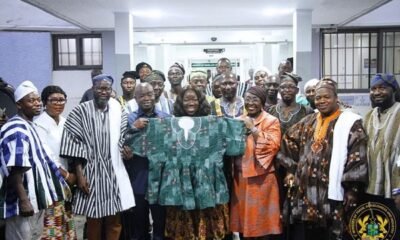Editorial
Let’s Prioritise Early Child Education
Dear Editor,
As we strive to build a brighter future for our nation, it is imperative we prioritise the foundation upon which it stands — early child education.
Early childhood education refers to the period of learning and development that takes place from birth to around the time when the child is about eight years old. It’s a critical phase where children develop foundational skills, knowledge, and attitudes that lay the groundwork for future success. It ensures and paves the way for cognitive development, learning, problem-solving, and critical thinking.
Investing in early child education is not merely a moral imperative but an economic necessity as well.
I urge policymakers and stakeholders to prioritise early child education, especially in our rural and deprived communities, to ensure that our children receive the nurturing and stimulating environment they deserve.
Some ways this could be achieved include increasing funding for early childhood education programmes and enhancing teacher training and support. Encouraging parental involvement will also go a long way to strengthen this foundation.
Our future is promising when we lay the best foundations for our young ones. By working together, we can give our children the best possible start in life — fostering a generation of resilient, creative, and compassionate individuals equipped to shape a brighter future for Ghana.
Theresa Tsetse Dzifa
Kaneshie
Editorial
Let’s act to make the Kumasi-Accra Highway safer for all
Dear Editor,
I write to express concern about the increasing rate of road accidents on the Kumasi–Accra highway, which has become a source of fear for many commuters.
It is one of the busiest roads in Ghana, connecting two major cities and serving thousands of passengers daily. Sadly, almost every week, we hear reports of fatal crashes, injuries, and loss of property along the stretch. Many families have lost loved ones, and several survivors are left with lifelong injuries.
The causes of these accidents are not far-fetched. Over-speeding, reckless overtaking, driver fatigue, poor vehicle maintenance, and disregard for road traffic regulations are major contributors.
In some sections, bad road conditions, faded road markings, and inadequate street lighting also increase the risk, especially at night and during rainy weather.
It is worrying that despite repeated accidents, little seems to change. Drivers continue to overspeed, some commercial drivers drive under pressure to meet unrealistic travel times, and enforcement of traffic laws appears weak in certain areas.
I, therefore appeal to the relevant authorities, including the Motor Traffic and Transport Department (MTTD) and the Ministry of Roads and Highways, to intensify road safety education, enforce traffic laws strictly, and ensure regular patrols on this highway.
Road signs should be improved, damaged portions of the road fixed promptly, and speed limits clearly enforced.
Drivers must also take personal responsibility by obeying traffic rules, avoiding unnecessary overtaking, and ensuring their vehicles are roadworthy. Passengers should speak up when drivers drive recklessly, because silence can cost lives.
Road accidents are preventable. Let us act now to make the Kumasi–Accra Highway safer for all users before more innocent lives are lost.
By Eugene Ampiaw, Takoradi
Join our WhatsApp Channel now!
https://whatsapp.com/channel/0029VbBElzjInlqHhl1aTU27

Editorial
Mamprobi Polyclinic incident unfortunate, but …
Dear Editor,
THE incident of baby theft at the Mamprobi Polyclinic on Tuesday was quite unfortunate.
It is very sad that a woman that has endured nine challenging months of pregnancy and gone through a Caesarian Section to deliver would go through such an unfortunate situation.
We should be grateful to God that the baby was found and reunited with mother a day after the disappearance.
This is not the first occurrence and I believe may not be the last and is the reason why I welcome the calls for improved security protocols at the various health facilities across the country.
Several speculative narratives are flying all over with calls for a harsher punishment.
As unfortunate as the action of the suspect was, it is important that she is also checked mentally and psychologically. A number of factors may have contributed to this action including an inability to conceive and the ensuing societal pressure and stigma of barrenness.
A lot of women are facing such challenges but have not mustered the courage to attempt such a heinous crime. This should occupy the minds of agencies responsible for women issues to increase awareness on situations like this.
A woman whose marriage is collapsing under the weight of barrenness can be affected psychologically and, in that situation, could arrive at any decision.
Naa Torshie,
Dansoman
Join our WhatsApp Channel now!
https://whatsapp.com/channel/0029VbBElzjInlqHhl1aTU27







